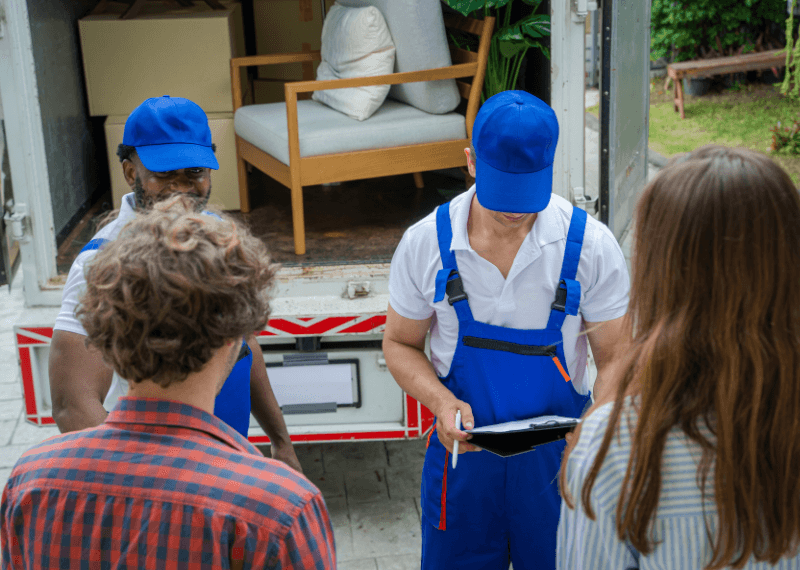Real Talk: What and Why
When you start planning a move, it’s critical to understand what items moving companies just won’t transport. Certain items are excluded due to safety, legal, or logistical reasons and other just because they don’t want the hassle.
Knowing these lists of items in advance can help you prepare effectively and avoid any last-minute surprises.
Here’s a breakdown of the commonly unaccepted items and the reasons behind the rules they make.
1. Dangerous Categorized Materials
Moving companies will not transport hazardous materials because they pose safety risks to their moving team. These items include:
- Flammable Items: Anything that can catch fire. Gasoline tanks, lighter fluid, propane tanks, or fireworks can ignite from a small spark and cause serious accidents during the move.
- Toxic Chemicals: Chemicals like pesticides, fertilizers, and certain cleaning products can be harmful to people and the environment. Any open jars of chemicals as well will not be accepted.
- Corrosive Materials: Substances like acids and batteries can damage other items and the moving truck.
2. Foods That Will Go Bad
Most moving companies will not transport perishable foods, such as:
- Refrigerated Items: Fresh fruits, vegetables, dairy, and meats can spoil during transit, especially on long-distance moves. Toss or donate those open half-finished bottles in the fridge and cut your losses.
- Opened Containers: Once food containers are opened, they can attract bugs and create odors, making them unsuitable for transport. Overall you will need to toss your kitchen stash and start anew.
3. Valuables and Important Documents
While moving companies can transport valuable items, it’s often discouraged due to security concerns:
- Cash and Jewelry: High-value items like large amounts of cash, jewelry, and collectibles should be kept with you to prevent loss or theft. You wouldn’t leave a wad of cash with a stranger, so don’t leave it with your movers.
- Important Documents: Passports, birth certificates, and legal documents should be moved personally to avoid potential loss. These should be in your essentials bag.
4. Personal Items
Certain personal items are better kept with you during a move:
- Sentimental Items: Family pieces or items with emotional value are best transported by you. If you would be sad to lose it and find it to be irreplaceable then this should be in your car.
- Medications: Prescriptions and other meds should be transported personally to ensure you have access to them when needed and that they are kept in the proper temperature settings.
5. Animals and Plants
Moving companies typically do not agree to move live animals or plants for many reasons:
- Animals: Pets require special care and conditions that moving companies cannot guarantee during transit. It’s best to arrange for pet transport separately. Your floppy friend should come with you in the car or be looked after during the move.
- Plants: Many states have certain laws regarding the transport of plants to prevent the spread of pests and diseases. As well moving plants can be a logistical nightmare with all their dirt and rocks the truck can get ruins quickly.
6. Large or Strange Items
Some items may be too big or awkward for traditional moving trucks:
- Surf and Sports Things: Equipment for certain sports can be huge. Longboards and surfboards as well as ski and snowboard items may not be allowed on board. Check ahead with your mover for any specific items.
- Pianos and Pool Tables: These require special handling and equipment and incur extra charges. Many long distance moving companies offer specialized transport services for such items, but they don’t include them in standard transport pricing.
- Heavy Machinery: Equipment like lawnmowers or exercise equipment may also fall into this category and require specialized moving services.
9. Certain Electronics
Some electronics may be restricted due to fragility or safety:
- Large Appliances: While many moving companies will transport appliances like refrigerators and washers, it’s essential to check with your mover. Some companies may not transport them due to their size and weight.
- Sensitive Equipment: High-end electronics like computers or sound systems can be delicate and may need special packing and handling. These items are best transported in your personal car.
Wrapping Up What is Allowed
Understanding the items that moving companies won’t agree to transport will help you plan your move more effectively. You can do rounds to your new house with your plants ahead of time when on the way and bring your cleaning supplies over in your car to get around these rules and save some funds by not having to rebuy these items.
By knowing all these restrictions above, you can make arrangements for those items, whether by finding alternative transport options or packing them to take with you. Check with your moving company for their specific policies, as regulations can vary. Being prepared and knowing what is allowed will help to ensure a smoother moving experience that doesn’t add stress. Now let’s hit the road with Pricing Van Lines today!
Frequently Asked Questions
How do I start creating my own moving inventory list?
Pick up a pen and paper (or your iPhone) and begin. Start with the big items and work your way through to the small household items in every room.
Keep a tally and write everything down along with photo evidence. Count the number of beds, bed frames, tvs, and so on so that you can hold your mover accountable and know what you have to work with.
How can I keep a huge moving goal realistic and attainable?
Deep breaths and appreciation of your own hard work is key. Every time you finish packing up another box or room, take a moment to celebrate your accomplishments and be proud. Acknowledging the small steps helps you reach the bigger ones.
This will keep you motivated and boost morale. Finishing up packing a room and cleaning it out is a huge task. Reward yourself and your family every step of the way.
What’s the best way to declutter before a move?
First things first, start by making three piles, keep, donate, and trash. Start room by room, and the moment the pile becomes full, get it out of your house so you can feel lighter.
It will feel overwhelming at first, but embrace it, and once fully packed up, stack your cartons in a central place that allows you to Dyson and mop all the floors. You will thank yourself for getting rid of all the excess and you will save on the move with less weight.
What do I do if I need storage in between move times?
No worries, just select our storage option on the site. Our storage units are a great option that can give you a bit of extra space, and extra time to deal with all the excess you just can’t part ways with.
We’ll find you the best storage unit for your needs, and we won’t charge an arm and a leg every month. Pricing Van Lines makes storage affordable with our selection of sizes, extra security, and climate-controlled options, we’ll make sure everything is safe and secure.
What is the best way to keep my items safe?
The truly important pieces I would recommend actually packing up in many layers of bubble wrap and towels and actually putting in your personal car if the option exists.
You can of course wrap these items and put them in a plastic bin with many layers of pillows, towels and more soft items and write “fragile” on top, but I think it’s better to play it safe than sorry.




